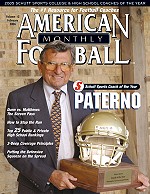AMERICAN FOOTBALL MONTHLY THE #1 RESOURCE FOR FOOTBALL COACHES
Article CategoriesAFM Magazine
|
Schutt Sports Div. I-A Coach of the Year Finalistsby: Curt Block© More from this issue Charlie Weis had amassed an impressive coaching resume punctuated with four Super Bowl rings, three with the New England Patriots and one with the 1990 New York Giants. This season the challenge was to transfer his success in the pro ranks to his first season in charge at Notre Dame. Could the magic he devised for Tom Brady translate to Brady Quinn? Would the genius of the master offensive coordinator in the NFL rub off on the defense and special teams in South Bend? Those were critical questions, to be sure. But Weis was equally concerned with a less tangible factor: Team Chemistry. Notre Dame had averaged close to 500 yards offensively and nearly 40 ppg. The season was totally gratifying and perhaps over achievers. To Weis, they’re among the many positives he could have only counted on the luck of the Irish to atta....The full article can only be seen by subscribers. Subscribe today!
|
|
|||||||
| HOME |
MAGAZINE |
SUBSCRIBE | ONLINE COLUMNISTS | COACHING VIDEOS |
Copyright 2026, AmericanFootballMonthly.com
All Rights Reserved





